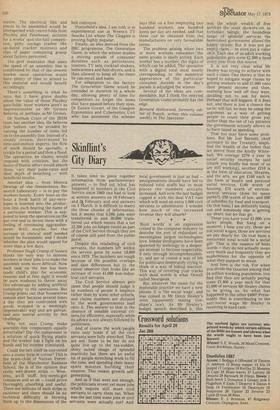Skinflint's City Diary
It takes time to piece together information from parliamentary answers — to find out what has happened to numbers in the Civil Service since 1969 one had to look at written answers on 19 February. and 4 February and oral answers on 3 March. It is difficult to marry the three chunks of information, but it seems that 8,500 jobs were transferred in and 30,800 transferred out which means that a net 22,300 jobs no longer count as part of the Civil Service though they are of course still paid from the public purse.
Despite this relabelling of civil servants, the numbers left within the service grew by some 19,000 since 1970. The numbers are rough because of the possible overlaps and date differences but to the casual observer that looks like an increase of over 41,000 non-industrial civil servants.
The Civil Service always gets upset that people should judge it by numbers of people it employs rather than by some other criteria, and claims numbers are dictated by the work governments load onto it. The answer to that is the absence of sensible external criteria for efficiency, especially while its advice is not always followed by politicians.
And of course the work/people ratio only holds if all the civil servants were fully stretched. They are not. Some to be fair do not quite live up to the tea-sodden, shiny suited image of splendid inactivity but there are an awful lot of people stretching work to fill the time, and spending their many spare minutes building their empires. This 'makes growth selfgenerating.
And as if that were not enough, the politicians invent yet more jobs which require still more civil servants to carry them out. When was the last time some jobs or civil servants were actually cut? And local government is just as bad — amalgamations should have led to reduced total staffs but in most places the numbers actually increased. And now the last budget capped it with the dual VAT rate which will need an extra 1,000 civil servants to admininster. I wonder how much of the increased revenue they will absorb?
'Buzz words' is an expression coined in the computer industry to describe the sort of redundant or meaningless jargon technologists love. Similar neologisms have been spawned by sociology in a desperate attempt to become respectable, if only through incomprehensibility, and are of course a way of life for politicians desperately trying to think of a way of hiding inaction. This way of covering your tracks with dead words is what Orwell called Newspeak.
But whatever the name for the deplorable practice we have a new phrase. It is 'the social wage', and was coined in Mr Denis Healey's mint (apparently testing Gresham's law). As Mr Healey's budget speech described it, this was the whole wealth of free services the state showers on us fortunate beings; the boundless range of splendid services the benevolent government allows the happy citizen. But it was not an empty claim — he even put a value on it. Each one of us adult working population gets some £1,000 a head every year from this source.
It is not very clear what Mr Healey was trying to achieve with such a claim. One theory is that he hoped to mitigate wage claims by getting workers to add £1,000 onto their present income and then, realising how well off they were, deciding not to ask for more. Perhaps that will happen. If it does not, and there is just a chance the tactic will fail, he may be using the argument as a way of getting people to count their gross pay rather than the net of tax pittance the government actually allows us to have taxed as spending.
That too may have some problems. But Mr Joel Barnett, chief secretary to the Treasury, amplified the wealth of the Indies that we derive from the kindly Whitehall. We average £270 a year in social security receipts he said (thank you kindly but most of us are still working), another £210 is in the form of education, libraries, and the arts, we get £180 each in the form of health and personal social services, £160 worth of housing, £70 worth of environmental services (does he mean parks?), £50 worth of law, and £60 of subsidies for food and transport. On that basis I am definitely losing out and somebody else is getting my share, but let that go.
Ther_e you have your £1,000, you lucky people. But hang on a moment, I hear you cry, those are not social wages, those are services we pay dearly for. On that basis a restaurant meal would be a social gift. That is the essence of buzz words — they do not actually mean very much and frequently they are euphemisms for the 'opposite of what they purport to mean.
And here is the rub. For when you divide the taxation among that 24 million working population, you find that they are actually paying some £1,400 a year each for that £1,000 of services Mr Healey claims to be giving us. So what has happened to the other £400? Presumably that is contributing to the anti-social wage Mr Healey is receiving in hard cash.


























 Previous page
Previous page